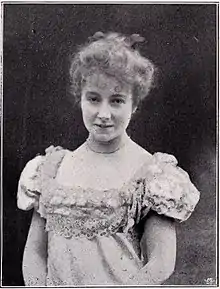Ethel Wright | |
|---|---|
 Portrait of Ethel Wright by Hayman Seleg Mendelssohn | |
| Born | c. 1866 London, England |
| Died | 1939 (aged 72–73) |
| Nationality | British |
| Education | Académie Julian, Paris |
| Occupation | Painter |
| Known for | Portraiture |
| Spouse | Mr Bradley |
Ethel Wright later Ethel Bradley (c. 1866 – 1939) was a British portrait painter, illustrator and model. Wright has several paintings in British national collections and her most famous work is a portrait of the suffragette leader Christabel Pankhurst, which is in the National Portrait Gallery.[1]
Work
Wright was born in between 1866 and 1869 in London. Her father was called John Wright. She sketched and copied paintings in the National Gallery and she became a student of John Seymour Lucas.[2]
She later studied at the Académie Julian in Paris with the support and on the advice of renowned portraitist Solomon Joseph Solomon[3] On her return he exhibited a painting in 1888 that he had made of her. Wright also sat for Arthur Hacker featuring in perhaps 50 of his paintings.[2] By the late 19th Century she was regularly exhibiting as a society portraitist at The Royal Academy[4] and achieved a profile as a painter in the 1890s identified in the modernist Rhythm Group.[5]
She was also known for painting Pierrot[6] which was exhibited at the Royal Academy of Arts in 1892[2] and bought by Oldham Art Gallery.
Following three years of living with her husband she went to America in 1901 where she successfully found work as an illustrator. She noted that American illustration was more advanced however American paintings were not so well. She returned in 1905 and briefly tried to reclaim her marriage.[2]
Suffragette Portraits
Having achieved some recognition as a society portraitist, Wright became increasingly political as did her portraits. Wright became a supporter of the suffragettes.[7][3] In 1909 Wright painted her most famous portrait, that of Christabel Pankhurst.[8]
Her full length portrait of Christabel Pankhurst was exhibited at "The Women's Exhibition", hosted by the WSPU, funded by Clara Mordan and held at the Prince's Ice Rink in Knightsbridge in May 1909.[7][9][10] Suffragette and marriage reformer, Una Duval, bought the painting and it remained in the family until being bequeathed by a descendent of the Duvals to the National Portrait Gallery in 2011,[11] it was first exhibited by them in 2018.
In 1912, Wright also painted a full length portrait of Una Dugdale dressed in bright jade with a background of fierce fighting cocks, entitled "The Music Room". This painting was first shown in London’s Stafford Gallery in the same year[12] and was exhibited as recently as 2020 in Pallant House Gallery, Chichester.[13] Ethel Wright was also responsible for the portrait which was featured on Una Duval's marriage reform pamphlet "Love, Honour and not Obey".
She continued to support the suffragettes until 1927[6] and the Representation of the People (Equal Franchise) Act 1928 gave women electoral equality with men.
Other work
In about 1915 she painted Beatrice, Lady Lever. She would become a hero of the Royal Free Hospital after she died as a result of volunteering as a nurse during World War One.
Legacy
Her painting of Christabel Pankhurst was donated by Una Duval's descendant to the National Portrait Gallery in 2011.[5] It was exhibited in 2018 when it was noted that the gallery had previously only had pictures of suffragettes taken by the police as suspicious characters.[7]
She achieved success as a painter but she was identified as a great woman artist.[3]
Personal life
She was "also known as Mrs Bradley".[3] She had married Bernard Armiger Barczinsky in 1897 in Liverpool. He was a theatrical producer and Wright later claimed that he had misrepresented himself. He changed his name to Barclay during the time they were together. He left her in 1900, she tried to reclaim the marriage but she divorced him in 1910.[2]
Wright died in 1939.[6]
References
- ↑ "Dame Christabel Pankhurst". National Portrait Gallery (London). Retrieved 12 September 2022.
- 1 2 3 4 5 "Ethel Wright". Spartacus Educational. Retrieved 19 April 2023.
- 1 2 3 4 "Ethel Bradley?". The Artist. 1898.
- ↑ "Facing the new century: women artists 1900–1909". Art UK. Retrieved 12 September 2022.
- 1 2 "Dame Christabel Pankhurst - National Portrait Gallery". www.npg.org.uk. Retrieved 2 May 2018.
- 1 2 3 Broadley, Rosie (5 March 2015). "Suffragette Painter: discovering Ethel Wright". National Portrait Gallery (London). Retrieved 8 February 2021.
- 1 2 3 Brown, Mark (24 July 2014). "Portrait of an angry lady: suffragette Christabel Pankhurst goes on display". the Guardian. Retrieved 2 May 2018.
- ↑ "Facing the new century: women artists 1900–1909". Art UK. Retrieved 12 September 2022.
- ↑ "Clara Mordan". Spartacus Educational. Retrieved 19 November 2017.
- ↑ [Sheila Stowell, A Stage of their own: Feminist playwrights of the suffrage era (Manchester: Manchester University Press, 1992), p. 53]
- ↑ "Dame Christabel Pankhurst 1880-1958". National Portrait Gallery. Retrieved 11 September 2022.
- ↑ "Radical women rescued from obscurity". Financial Times. Retrieved 11 September 2022.
- ↑ "Radical Women: Jessica Dismorr and her Contemporaries". Studio International. Retrieved 11 September 2022.
External links
- 4 artworks by or after Ethel Wright at the Art UK site